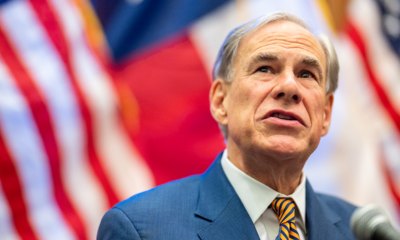News
Minneapolis Promises Police Overhaul in Deal With Justice Department

The Minneapolis City Council unanimously voted on Monday to overhaul its police department to address a pattern of systemic abuses, as part of an agreement with the Department of Justice.
Lawyers from the Department of Justice and the city, where George Floyd was killed in 2020 by a police officer, have raced in recent weeks to finalize terms of the deal, known as a consent decree, before President-elect Donald J. Trump takes office. The previous Trump administration opposed the use of consent decrees, and the fate of nearly a dozen other federal investigations into American police departments is uncertain.
Under the deal approved on Monday, the Minneapolis department promised to closely track and investigate allegations of police misconduct, rein in the use of force, and improve officer training.
“This agreement reflects what our community has asked for and what we know is necessary: real accountability and meaningful change,” Mayor Jacob Frey of Minneapolis said in a statement.
Federal oversight, the strongest tool available to overhaul police departments with histories of abuse, begins with an exhaustive civil rights investigation and a report of findings. Cities then usually agree to negotiate a consent decree, a court-enforced oversight agreement, in order to avoid a federal lawsuit.
The Minneapolis decree was set in motion in the summer of 2023 after the Department of Justice issued a report accusing the city’s police department of routinely discriminating against Black and Native American residents, of needlessly using deadly force and of violating the First Amendment rights of protesters and journalists. The Minneapolis police union did not immediately respond to a request for comment.
City officials and lawyers from the Justice Department said they intended to present the deal to a federal judge, who will be responsible for overseeing its implementation.
During Mr. Trump’s first term in the White House, the Justice Department rejected such decrees, coming out in opposition to deals in Chicago and Baltimore and refraining from entering new ones. More recently, during a campaign rally last year, Mr. Trump said that in order to crack down on crime, the police should be allowed to be “extraordinarily rough,” and he spoke about the possibility of letting officers loose from constraints during “one really violent day.”
Officials in Minneapolis said they would remain committed to lasting change in the city’s police department, even if the Trump administration were to walk away from federal consent decrees. Several months before the Department of Justice report was issued, the city agreed to a policing overhaul as part of an agreement with the Minnesota Department of Human Rights.
Minneapolis set aside $27 million in its 2024 and 2025 budgets to pay for changes in response to the state and federal investigations. The city also paid $27 million to Mr. Floyd’s family in 2021 to settle their wrongful death lawsuit.
Consent decrees were pursued aggressively under President Barack Obama, whose administration entered into 15 of the decrees in a time of a growing public outcry over police abuses.
After Mr. Trump’s administration steered away from such decrees, the Justice Department under the Biden administration sought to bring them back, launching a dozen civil rights investigations into police departments.
But the Biden administration has been slow to bring those efforts to a resolution, in some cases letting years elapse. The Justice Department’s civil rights division has released a flurry of investigative findings in recent weeks, covering cities like Memphis, where the department found excessive force and racial discrimination; Mount Vernon, N.Y., where it found illegal arrests and strip searches; and Oklahoma City, where it found chronic mistreatment of people with behavioral disabilities by the police.
Some cities, like Memphis and Phoenix, which was the subject of an investigation after an extraordinarily high number of shootings by the police, have balked at entering into oversight agreements. The agreements usually call for changes in a number of aspects of a police department’s operations, training, policies and discipline, and can take a decade to complete.
The Biden administration is currently enforcing 15 consent decrees reached under previous administrations, but has completed only one other new one besides Minneapolis, in Louisville, Ky.
Those agreements and the department’s remaining investigations will be handed over to the Trump administration.
Devlin Barrett contributed reporting.

News
What to know about Kilmar Abrego Garcia’s release from immigration custody

BALTIMORE — Kilmar Abrego Garcia, whose mistaken deportation helped galvanize opposition to President Donald Trump’s immigration policies, was released from immigration detention on Thursday, and a judge has temporarily blocked any further efforts to detain him.
Abrego Garcia currently can’t be deported to his home country of El Salvador thanks to a 2019 immigration court order that found he had a “well founded fear” of danger there. However, the Trump administration has said he cannot stay in the U.S. Over the past few months, government officials have said they would deport him to Uganda, Eswatini, Ghana and, most recently, Liberia.
Abrego Garcia is fighting his deportation in federal court in Maryland, where his attorneys claim the administration is manipulating the immigration system to punish him for successfully challenging his earlier deportation.
Here’s what to know about the latest developments in the case:
Abrego Garcia is a Salvadoran citizen with an American wife and child who has lived in Maryland for years. He immigrated to the U.S. illegally as a teenager to join his brother, who had become a U.S. citizen. In 2019, an immigration judge granted him protection from being deported back to his home country.
While he was allowed to live and work in the U.S. under Immigration and Customs Enforcement supervision, he was not given residency status. Earlier this year, he was mistakenly deported to El Salvador, despite the earlier court ruling.
When Abrego Garcia was deported in March, he was held in a notoriously brutal Salvadoran prison despite having no criminal record.
The Trump administration initially fought efforts to bring him back to the U.S. but eventually complied after the U.S. Supreme Court weighed in. He returned to the U.S. in June, only to face an arrest warrant on human smuggling charges in Tennessee. Abrego Garcia was held in a Tennessee jail for more than two months before he was released on Friday, Aug. 22, to await trial in Maryland under home detention.
His freedom lasted a weekend. On the following Monday, he reported to the Baltimore immigration office for a check-in and was immediately taken into immigration custody. Officials announced plans to deport him to a series of African countries, but they were blocked by an order from U.S. District Judge Paula Xinis in Maryland.
On Thursday, after months of legal filings and hearings, Xinis ruled that Abrego Garcia should be released immediately. Her ruling hinged on what was likely a procedural error by the immigration judge who heard his case in 2019.
Normally, in a case like this, an immigration judge will first issue an order of removal. Then the judge will essentially freeze that order by issuing a “withholding of removal” order, according to Memphis immigration attorney Andrew Rankin.
In Abrego Garcia’s case, the judge granted withholding of removal to El Salvador because he found Abrego Garcia’s life could be in danger there. However, the judge never took the first step of issuing the order of removal. The government argued in Xinis’ court that the order of removal could be inferred, but the judge disagreed.
Without a final order of removal, Abrego Garcia can’t be deported, Xinis ruled.
The only way to get an order of removal is to go back to immigration court and ask for one, Rankin said. But reopening the immigration case is a gamble because Abrego Garcia’s attorneys would likely seek protection from deportation in the form of asylum or some other type of relief.
One wrinkle is that immigration courts are officially part of the executive branch, and the judges there are not generally viewed as being as independent as federal judges.
“There might be independence in some areas, but if the administration wants a certain result, by all accounts it seems they’re going to exert the pressure on the individuals to get that result,” Rankin said. “I hope he gets a fair shake, and two lawyers make arguments — somebody wins, somebody loses — instead of giving it to an immigration judge with a 95% denial rate, where everybody in the world knows how it’s gonna go down.”
Alternatively, the government could appeal Xinis’ order to the 4th U.S. Circuit Court of Appeals and try to get her ruling overturned, Rankin said. If the appeals court agreed with the government that the final order of removal was implied, there could be no need to reopen the immigration case.
In compliance with Xinis’ order, Abrego Garcia was released from immigration detention in Pennsylvania on Thursday evening and allowed to return home for the first time in months. However, he was also told to report to an immigration officer in Baltimore early the next morning.
Fearing that he would be detained again, his attorneys asked Xinis for a temporary restraining order. Xinis filed that order early Friday morning. It prohibits immigration officials from taking Abrego Garcia back into custody, at least for the time being. A hearing on the issue could happen as early as next week.
Meanwhile, in Tennessee, Abrego Garcia has pleaded not guilty in the criminal case where he is charged with human smuggling and conspiracy to commit human smuggling.
Prosecutors claim he accepted money to transport, within the United States, people who were in the country illegally. The charges stem from a 2022 traffic stop in Tennessee for speeding. Body camera footage from a Tennessee Highway Patrol officer shows a calm exchange with Abrego Garcia. There were nine passengers in the car, and the officers discussed among themselves their suspicions of smuggling. However, Abrego Garcia was eventually allowed to continue driving with only a warning.
Abrego Garcia has asked U.S. District Court Judge Waverly Crenshaw to dismiss the smuggling charges on the grounds of “selective or vindictive prosecution.”
Crenshaw earlier found “some evidence that the prosecution against him may be vindictive” and said many statements by Trump administration officials “raise cause for concern.” Crenshaw specifically cited a statement by Deputy Attorney General Todd Blanche on a Fox News Channel program that seemed to suggest the Justice Department charged Abrego Garcia because he won his wrongful-deportation case.
The two sides have been sparring over whether senior Justice Department officials, including Blanche, can be required to testify in the case.
News
Afghan CIA fighters face stark reality in the U.S. : Consider This from NPR

A makeshift memorial stands outside the Farragut West Metro station on December 01, 2025 in Washington, DC. Two West Virginia National Guard troops were shot blocks from the White House on November 26.
Heather Diehl/Getty Images
hide caption
toggle caption
Heather Diehl/Getty Images
They survived some of the Afghanistan War’s most grueling and treacherous missions.
But once they evacuated to the U.S., many Afghan fighters who served in “Zero Units” found themselves spiraling.
Among their ranks was Rahmanullah Lakanwal, the man charged with killing one National Guard member and seriously injuring a second after opening fire on them in Washington, D.C. on Thanksgiving Eve.
NPR’s Brian Mann spoke to people involved in Zero Units and learned some have struggled with mental health since coming to the U.S. At least four soldiers have died by suicide.
For sponsor-free episodes of Consider This, sign up for Consider This+ via Apple Podcasts or at plus.npr.org. Email us at considerthis@npr.org.
This episode was produced by Erika Ryan and Karen Zamora. It was edited by Alina Hartounian and Courtney Dorning.
Our executive producer is Sami Yenigun.
News
Video: Behind the Supreme Court’s Push to Expand Presidential Power

new video loaded: Behind the Supreme Court’s Push to Expand Presidential Power
By Ann E. Marimow, Claire Hogan, Stephanie Swart and Pierre Kattar
December 12, 2025
-

 Alaska7 days ago
Alaska7 days agoHowling Mat-Su winds leave thousands without power
-

 Texas1 week ago
Texas1 week agoTexas Tech football vs BYU live updates, start time, TV channel for Big 12 title
-
Ohio1 week ago
Who do the Ohio State Buckeyes hire as the next offensive coordinator?
-

 Washington4 days ago
Washington4 days agoLIVE UPDATES: Mudslide, road closures across Western Washington
-

 Iowa6 days ago
Iowa6 days agoMatt Campbell reportedly bringing longtime Iowa State staffer to Penn State as 1st hire
-

 Miami, FL6 days ago
Miami, FL6 days agoUrban Meyer, Brady Quinn get in heated exchange during Alabama, Notre Dame, Miami CFP discussion
-

 Cleveland, OH6 days ago
Cleveland, OH6 days agoMan shot, killed at downtown Cleveland nightclub: EMS
-
World6 days ago
Chiefs’ offensive line woes deepen as Wanya Morris exits with knee injury against Texans
























